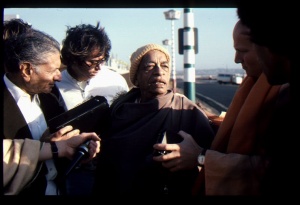CC Madhya 17.60 (1975): Difference between revisions
(Vanibot #0027: CCMirror - Mirror CC's 1996 edition to form a basis for 1975) |
(Vanibot #0020: VersionCompareLinker - added a link to the Version Compare feature) |
||
| Line 2: | Line 2: | ||
<div style="float:left">'''[[Sri Caitanya-caritamrta (1975)|Śrī Caitanya-caritāmṛta (1975)]] - [[CC Madhya (1975)|Madhya-līlā]] - [[CC Madhya 17 (1975)|Chapter 17: The Lord Travels to Vṛndāvana]]'''</div> | <div style="float:left">'''[[Sri Caitanya-caritamrta (1975)|Śrī Caitanya-caritāmṛta (1975)]] - [[CC Madhya (1975)|Madhya-līlā]] - [[CC Madhya 17 (1975)|Chapter 17: The Lord Travels to Vṛndāvana]]'''</div> | ||
<div style="float:right">[[File:Go-previous.png|link=CC Madhya 17.59 (1975)|Madhya-līlā 17.59]] '''[[CC Madhya 17.59 (1975)|Madhya-līlā 17.59]] - [[CC Madhya 17.61 (1975)|Madhya-līlā 17.61]]''' [[File:Go-next.png|link=CC Madhya 17.61 (1975)|Madhya-līlā 17.61]]</div> | <div style="float:right">[[File:Go-previous.png|link=CC Madhya 17.59 (1975)|Madhya-līlā 17.59]] '''[[CC Madhya 17.59 (1975)|Madhya-līlā 17.59]] - [[CC Madhya 17.61 (1975)|Madhya-līlā 17.61]]''' [[File:Go-next.png|link=CC Madhya 17.61 (1975)|Madhya-līlā 17.61]]</div> | ||
{{CompareVersions|CC|Madhya 17.60|CC 1975|CC 1996}} | |||
{{RandomImage}} | {{RandomImage}} | ||
==== TEXT 60 ==== | ==== TEXT 60 ==== | ||
<div class="verse"> | <div class="verse"> | ||
:yāhāṅ vipra nāhi tāhāṅ | :yāhāṅ vipra nāhi tāhāṅ 'śūdra-mahājana' | ||
: | :āsi' sabe bhaṭṭācārye kare nimantraṇa | ||
</div> | </div> | ||
| Line 18: | Line 17: | ||
<div class="synonyms"> | <div class="synonyms"> | ||
yāhāṅ—wherever; vipra—brāhmaṇa; nāhi—there is not; tāhāṅ—there; śūdra-mahā-jana—devotees born in families other than brāhmaṇa; | yāhāṅ—wherever; vipra—brāhmaṇa; nāhi—there is not; tāhāṅ—there; śūdra-mahā-jana—devotees born in families other than brāhmaṇa; āsi'-coming; sabe—all of them; bhaṭṭācārye—to Balabhadra Bhaṭṭācārya; kare nimantraṇa—make invitation. | ||
</div> | </div> | ||
Latest revision as of 10:52, 27 January 2020

A.C. Bhaktivedanta Swami Prabhupada
TEXT 60
- yāhāṅ vipra nāhi tāhāṅ 'śūdra-mahājana'
- āsi' sabe bhaṭṭācārye kare nimantraṇa
SYNONYMS
yāhāṅ—wherever; vipra—brāhmaṇa; nāhi—there is not; tāhāṅ—there; śūdra-mahā-jana—devotees born in families other than brāhmaṇa; āsi'-coming; sabe—all of them; bhaṭṭācārye—to Balabhadra Bhaṭṭācārya; kare nimantraṇa—make invitation.
TRANSLATION
In some villages there were no brāhmaṇas; nonetheless, devotees born in non-brāhmaṇa families came and extended invitations to Balabhadra Bhaṭṭācārya.
PURPORT
Actually a sannyāsī or a brāhmaṇa will not accept an invitation extended by a person born in a lower family. However, there are many devotees who are raised to the platform of brāhmaṇa by their initiation. These people are called śūdra-mahājana. This indicates that one who is born in a non-brāhmaṇa family has accepted the brāhmaṇa status by initiation. Such devotees extended invitations to Balabhadra Bhaṭṭācārya. A Māyāvādī sannyāsī will accept an invitation only from a brāhmaṇa family, but a Vaiṣṇava does not accept an invitation from a brāhmaṇa if he does not belong to the Vaiṣṇava sect. However, a Vaiṣṇava will accept an invitation from a brāhmaṇa or śūdra-mahājana if that person is an initiated Vaiṣṇava. Śrī Caitanya Mahāprabhu Himself accepted invitations from śūdra-mahājanas, and this confirms the fact that anyone initiated by a Vaiṣṇava mantra can be accepted as a brāhmaṇa. One can accept an invitation from such a person.